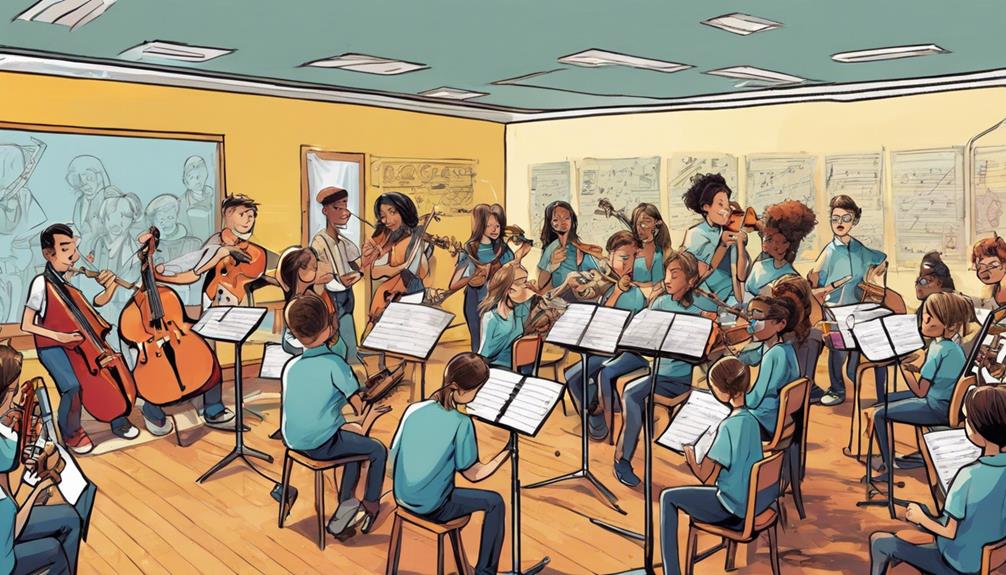To get into a good music school, you'll need to prepare thoroughly for the audition process, which typically includes repertoire selections, scales, sight-reading, and interviews. Tailor your preparation to meet the specific demands of each school, as some may require pre-screen auditions before live auditions. Being well-prepared for sight-reading and interviews can give you an edge over other applicants. Building instrumental skills through regular practice and developing a diverse repertoire that showcases your abilities are essential. By doing your research and understanding what each school looks for, you'll be well on your way to a successful audition – and that's just the beginning of your journey.
Key Takeaways
- Tailor your audition preparation to meet the specific demands of each school, including repertoire, scales, and sight-reading.
- Develop a diverse repertoire that showcases your instrumental skills and musical abilities to stand out from other applicants.
- Research and understand the academic and musical requirements of each school, including GPA, test scores, and audition requirements.
- Actively participate in musical endeavors from an early age, including learning music theory, history, and piano classes to enhance your music education.
- Evaluate music programs based on curriculum, faculty expertise, performance opportunities, and facilities to find the best fit for your goals.
Understanding Audition Criteria
When preparing to audition for a music school, it's important to explore the specific criteria each institution uses to evaluate applicants, as understanding these requirements is essential for effectively showcasing your skills. Music schools vary widely in their audition criteria, depending on the instrument, program, and school. Typically, auditions include repertoire selections, scales, sight-reading, and interviews. Some schools may also require pre-screen auditions before live auditions to narrow down the applicant pool.
Researching and adhering to each school's audition criteria can greatly impact your acceptance chances. By understanding what's expected, you can tailor your preparation to meet the specific demands of each school.
For instance, if a school requires a specific piece or style of music, you'll want to make sure you're well-rehearsed in that area. Additionally, being prepared for sight-reading and interviews can give you an edge over other applicants.
Choosing the Right Major

You'll want to choose a major that aligns with your musical aspirations and career goals, as each music major has unique focuses and requirements. When majoring in music, it's crucial to select a program that matches your interests and future plans.
Here are three key areas to take into account:
- Performance and Education: If you're interested in teaching or performing, Music Performance or Music Education might be the way to go. Music Performance majors focus on mastering an instrument, while Music Education majors prepare you to teach music in K-12 settings, emphasizing pedagogy and music theory.
- Therapy and Technology: If you're passionate about using music to help others or working behind the scenes, Music Therapy or Music Tech/Recording could be the perfect fit. Music Therapy majors learn to use music as a therapeutic tool, while Music Tech/Recording majors focus on the technical aspects of music production.
- History and Theory: If you're fascinated by the history and theory of music, Music History/Musicology might be the ideal choice. This major explores the rich history of music and its cultural significance.
Academic and Musical Requirements

In order to gain admission to a reputable music school, understanding the academic and musical requirements that can determine the success of your application is vital. You should be aware that different music schools prioritize different aspects of your application. While some liberal arts schools offering music programs consider academic qualifications like GPA, SAT scores, and musical talent, music-only schools typically focus more on your musical experience and talent rather than academic performance.
In the admissions process, you'll likely need to meet specific academic requirements, such as a minimum GPA or standardized test scores. Additionally, you may need to demonstrate your musical talent through an audition process, which may involve performing a piece, taking a music theory exam, or showcasing your skills in a particular instrument.
It's important to research the specific audition requirements for each school you're applying to, as these can vary significantly. By understanding the academic and musical requirements, you can tailor your application to showcase your strengths and increase your chances of getting accepted into your top-choice music school.
Preparing for the Audition

When getting ready for the audition, it's crucial to concentrate on building your instrumental skills through regular practice. This will help you develop confidence and proficiency. You should also focus on creating a strong, diverse repertoire that showcases your abilities and versatility. By doing so, you'll be well-prepared to demonstrate your skills to the audition panel.
Practice Your Instrument
Your daily practice routine becomes an essential element in preparing for a successful audition, and dedicating hours each day to honing your instrumental skills is crucial to building proficiency and confidence. This consistent practice helps you develop muscle memory, allowing you to focus on the musical aspects of your performance during the audition.
Here are three key aspects to focus on in your practice routine:
- Work with a private instructor to improve your technique, address weaknesses, and refine your musical interpretations.
- Record your practice sessions to track your progress, identify areas for improvement, and prepare for prescreen auditions.
- Create a practice schedule that includes scales, etudes, and audition repertoire to guarantee a well-rounded preparation.
Develop a Strong Repertoire
You'll greatly enhance your audition chances by developing a strong repertoire that showcases your musical versatility and technical proficiency. A diverse repertoire is vital, as it demonstrates your ability to adapt to different styles, time periods, and technical challenges.
When selecting pieces, choose ones that highlight your strengths and abilities on your instrument, as this will impress the audition panel. It's also essential to align your repertoire with the requirements and expectations of the music school you're applying to.
Incorporate contrasting pieces to display a range of musical expression, dynamics, and technical skills. Seek guidance from music teachers or mentors to select and prepare a well-rounded repertoire tailored to your strengths and abilities.
A well-planned repertoire won't only demonstrate your technical skills but also your musicality and artistry. By doing so, you'll be able to confidently showcase your abilities to the audition panel and increase your chances of getting accepted into a good music school.
Enhancing Your Musical Skills

One key factor in getting accepted into a good music school is having exceptional musical skills, which can be achieved by actively participating in various musical endeavors from an early age. This can be done by joining youth orchestras, high school ensembles, and music classes to enhance your musical skills.
Here are three ways to take your skills to the next level:
- Learn music theory, history, and piano classes to gain a well-rounded music education.
- Join various ensembles to broaden your musical experiences and skills.
- Regularly practice and improve your sight-reading skills to excel in auditions and performances.
Developing a strong foundation by learning an instrument early and engaging in daily rehearsals is essential. By doing so, you'll be able to refine your skills and become a proficient musician.
Selecting the Right Music School

As you search for the perfect music school, you'll want to take into account two important factors: location and accessibility, and program and faculty.
You should think about whether the school's location will provide you with the right opportunities and environment to grow as a musician, and whether the programs and faculty will offer the specialized training you need.
Location and Accessibility
When selecting a music school, take into account the location's impact on your daily commute, networking opportunities, and access to music industry resources and experiences. The location of your music school can greatly influence your overall experience and future career prospects.
Here are three key factors to assess when evaluating a music school's location and accessibility:
- Proximity to music venues and studios: Being close to music venues, studios, and cultural hubs can provide you with practical experience and connections in the industry.
- Transportation options: Evaluate the transportation options available to reach the school, such as public transport, driving, or walking distance.
- On-campus resources: Check for the availability of practice rooms, performance spaces, and music libraries on campus for convenient access to resources.
Additionally, take into account the surrounding community's musical scene and opportunities for off-campus performances, collaborations, and internships. A music school located in an area with a thriving music scene can provide you with endless opportunities to network, perform, and gain industry experience.
Program and Faculty
Exploring the music program's curriculum, faculty expertise, and performance opportunities is essential to ensuring they align with your goals and interests. You want to make sure the program you choose will provide you with the skills and knowledge you need to succeed in your desired field.
Evaluate the faculty's backgrounds, teaching styles, and reputation within the music industry to gauge the quality of education you'll receive. Are they experienced professionals with a track record of producing successful students? Do they have connections to the industry that can open doors for you?
Also, consider the facilities, practice spaces, and resources available at the music school. Will you have access to state-of-the-art equipment, recording studios, and performance venues? Are there opportunities for collaboration, networking, and performance?
Look into the alumni network and post-graduation opportunities provided by the music school to assess potential career pathways and success rates. What are the school's graduates doing now? Are they working in the industry, pursuing further education, or achieving success in their own right?
Navigating the Application Process

You'll need to research different music schools and programs to determine their specific application requirements, which can vary greatly from one institution to another. This is important in ensuring you meet the necessary criteria for your desired program.
Here are three essential steps to navigate the application process:
- Clarify application deadlines and processes: Reach out to admission offices to confirm deadlines and understand the application process.
- Prepare for auditions: Auditions play a significant role in the acceptance decision, so make sure to prepare thoroughly and follow the exact audition instructions provided by each music school.
- Stay organized and submit accurately: Keep track of deadlines and submit all required materials accurately and on time to avoid any mishaps.
Tips for a Successful Audition

With auditions playing a crucial role in the music school admission process, it's essential to fine-tune your performance skills and presentation to stand out from the competition. To increase your chances of success, practice regularly and thoroughly to showcase your skills during auditions. Choose audition pieces that highlight your strengths and abilities, and seek feedback from your piano teacher or mentors to improve your performance.
| Audition Tip | Why it Matters | How to Do It |
|---|---|---|
| Practice regularly | To showcase your skills | Set aside dedicated practice time |
| Choose the right piece | To highlight your strengths | Select a piece that demonstrates your abilities |
| Dress professionally | To make a good impression | Wear attire that presents you in a professional light |
| Arrive early | To reduce stress and anxiety | Plan to arrive at least 30 minutes before your audition |
| Follow instructions | To demonstrate your attention to detail | Read and follow the audition instructions carefully |
On audition day, arrive early, dressed professionally, and be prepared to perform under pressure. If you're participating in recorded auditions, make sure you're comfortable with the recording process. Remember, your audition is your chance to showcase your playing level, so make it count.
Frequently Asked Questions
What to Know Before Going to Music School?
Before going to music school, you should know the different types of music majors, academic requirements, and pathways, and prepare by developing sight-reading skills, exploring diverse genres, and attending live concerts. Understanding how to get into music school involves researching audition requirements and building a strong portfolio that showcases your abilities and unique style. Additionally, networking with current students, professors, and alumni can provide valuable insights into the program and help you make an informed decision. By being proactive and dedicated, you can position yourself as a competitive candidate for admission.
Is It Hard to Get Into Music School?
Yeah, it's super tough to get into music school – acceptance rates can be as low as 5%! You'll need to bring your A-game with rigorous auditions, strong academics, and a passion that shines through.
What Makes a Good Music Student?
To become a good music student, you need to demonstrate exceptional talent, strong musical skills, discipline, and passion. You must practice regularly, engage in ensembles and classes, and show a willingness to learn and grow.
Can You Go to Music School as a Beginner?
You think you can just waltz into music school as a beginner? Think again Most schools require instrument proficiency, but don't worry, preparatory programs, private lessons, and community college courses can get you up to speed.
Conclusion
You've made it to the final step.
You're probably thinking, 'I've got the skills, but what if I don't get in?' Remember, rejection isn't the end. Many successful musicians have faced rejection before achieving their goals.
Focus on building your skills, staying persistent, and patient, and the right opportunity will come along.
By following these steps, you'll increase your chances of getting into a good music school and setting yourself up for a successful career in music.










